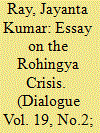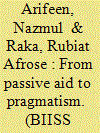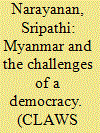|
|
|
Sort Order |
|
|
|
Items / Page
|
|
|
|
|
|
|
| Srl | Item |
| 1 |
ID:
158269


|
|
|
|
|
| Summary/Abstract |
“Clearly, Nepalis have to adapt to climate change. It is less clear what precisely the challenges are and who is best positioned to lead the response.” Seventh in a series on climate adaptation around the world.
|
|
|
|
|
|
|
|
|
|
|
|
|
|
|
|
| 2 |
ID:
159661


|
|
|
| 3 |
ID:
173519


|
|
|
|
|
| Summary/Abstract |
The flow of illegal migration has always been high in the continent of Asia. Almost every country is tring to deal with this problem in Asia. That is why none of the Asian countries is ready to welcome the Rohingyamuslims in their country, as their country is already flooded over population. But the international organization and western countries has a different way of looking to the Rohingya issue.
|
|
|
|
|
|
|
|
|
|
|
|
|
|
|
|
| 4 |
ID:
165531


|
|
|
|
|
| Summary/Abstract |
The ideas espoused in ‘diplomacy’ inherently contradict what ‘humanitarianism’ entails, if one goes by the realist or neoliberal institutionalist schools in international relations. They contend that states, whose primary concerns are to maximize power or security in an anarchic international system, cannot have the indulgence to be humanitarian, theoretically speaking at the very least. Nonetheless, humanitarian diplomacy has been instrumental in resolving intractable conflicts and severe crises that states and the United Nations (UN) were unable to fix. This paper explores why the idea of humanitarian diplomacy has not caught on by focusing on its tension with state-centrism, legal weaknesses and the problem of politicization by powerful states. An evolving and thriving praxis of humanitarianism is, then, discussed as the international community strives to ameliorate human sufferings. Despite tensions arising mostly out of how humanitarian diplomacy has been (ab) used by powerful states, the paper traces new trends where states are shifting their focus from passive aid to pragmatism. Based on a case study of humanitarian diplomacy in the Rohingya crisis, the paper offers some evidence on how states utilize humanitarian diplomatic instruments.
|
|
|
|
|
|
|
|
|
|
|
|
|
|
|
|
| 5 |
ID:
164338


|
|
|
| 6 |
ID:
151883


|
|
|
| 7 |
ID:
183188


|
|
|
|
|
| Summary/Abstract |
The United Nations embraced the doctrine of “Responsibility to Protect” (R2P) in 2005, which states that it is a shared responsibility of the international community to protect peoples from the atrocities of war crimes, crimes against humanity, ethnic cleansing, and genocide. Regarding Myanmar, the UN Human Rights Council claimed there were gross violations of human rights and international law in Myanmar's Rakhine state. Also, the UN Independent Fact-Finding Mission found evidence of genocide, crimes against humanity, and war crimes, and accordingly requested that the international community employ R2P to protect the Rohingya people. The UN High Commissioner for Human Rights acknowledged the clearance operation that occurred on 25 August 2017 at the hands of the Myanmar military regime was a “textbook example of ethnic cleansing”. In spite of this, the international community has taken no effective measures to protect the Rohingya community from what was an “entirely predictable” act of genocide. This paper is a qualitative investigation, a review of possible strategic reasons for why the international community has failed to protect the Rohingya. The paper relies on secondary scholarly literature, policy records, UN, government, and NGO reports, grey literature sources, and online materials. ASEAN's non-interference strategy, the OIC's dependency on diplomacy, the EU's priority for the hybrid democratic transition of Myanmar, the UN's political dialogue strategy, and the UN Security Council's structural weaknesses are obstacles to the international community preventing genocide in Myanmar. This study contributes to understanding the strategies of ASEAN, OIC, EU, UN, ICC, and the ICJ in relation to the Rohingya issue. It examines the chances of these organisations championing R2P, and also considers whether the Rohingya crisis is too intractable or difficult to resolve under current arrangements.
|
|
|
|
|
|
|
|
|
|
|
|
|
|
|
|
| 8 |
ID:
176526


|
|
|
|
|
| Summary/Abstract |
In spite of ASEAN’s perceived inertia, there appears to be domestic pressure in key member states for a more activist approach.
|
|
|
|
|
|
|
|
|
|
|
|
|
|
|
|
| 9 |
ID:
156873


|
|
|
|
|
|
|
|